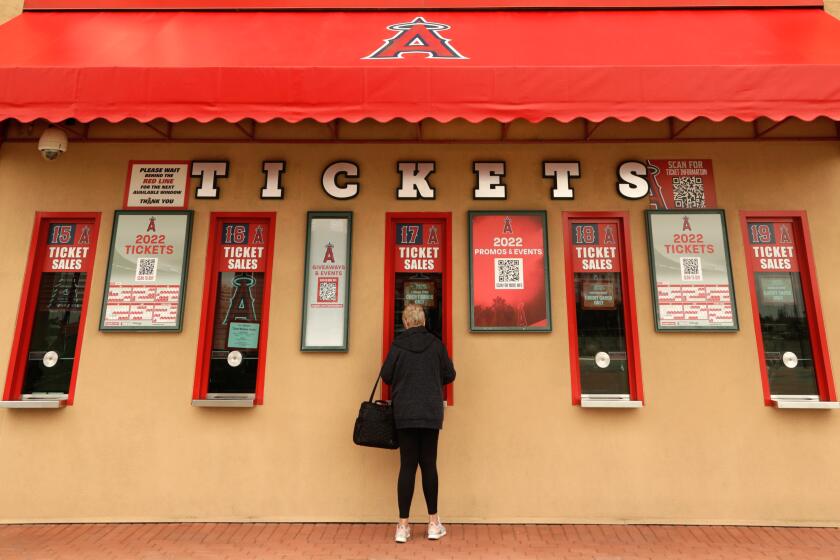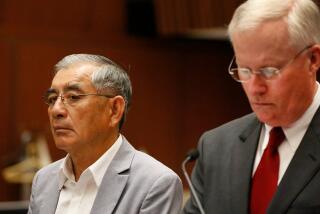Ex-state Democratic Party leader who helped FBI in Anaheim probe agrees to plead guilty to wire fraud

A California Democratic Party leader who was central to a wide-reaching corruption investigation in Anaheim involving the proposed sale of Angel Stadium has agreed to plead guilty to attempted wire fraud, the U.S. Department of Justice said Thursday.
Melahat Rafiei, 45, previously secretary for the California Democratic Party and a member of the Democratic National Committee, was a well-known political consultant in Orange County.
In late 2019, according to a plea agreement filed in federal court Thursday, Rafiei told a commercial cannabis company owner that she would work to pass a marijuana-related ordinance in Anaheim that would benefit the business, in exchange for a payment of at least $300,000.
What she didnât tell the client was that she was already working on an ordinance on behalf of other people.
Rafiei also told the client that she would give $200,000 of the payment to the Anaheim Chamber of Commerce and keep only $10,000 for her work. Instead, she intended to keep $100,000, the agreement said.
Records from an FBI probe show how business interests run the Orange County city home to Disneyland and the Angels.
According to the agreement, Rafiei instructed her client to pay the $300,000 through checks made out to various entities. She planned to deposit the money in accounts she controlled and âtransmit a portion of the funds to others.â
Rafiei has agreed to plead guilty to a single count of attempted wire fraud, which carries a maximum sentence of 20 years in prison. She is scheduled to appear in federal court in Santa Ana early next month.
In a statement provided to The Times by her attorney, Rafiei declined to discuss the specifics of the plea agreement.
âI will share my story, in due time,â she said in the statement. âFor now, I will proceed with dignity and humility towards finding peace and clarity in my life.â
The plea deal, she said, will âbring certainty, closure and a path forward.â
After Rafiei was arrested in 2019, she began assisting federal investigators. With her help, the FBI learned that Anaheim was controlled by a âsmall cadre of individuals,â including former Mayor Harry Sidhu and Todd Ament, the former president and chief executive of the Anaheim Chamber of Commerce.
The mayor was accused in a federal search warrant affidavit in May of divulging confidential information to the Angels during the teamâs negotiations with the city over the $320-million sale of Angel Stadium in hopes of receiving a million-dollar campaign donation. The affidavit also alleged that Sidhu obstructed an Orange County Grand Jury investigation into the deal. Sidhu has not been charged and has denied wrongdoing.
The discovery shook Anaheimâs political establishment, prompting Sidhuâs resignation and leading to criminal charges against Ament. The FBI accused Ament of plotting with an unnamed political consultant to funnel Chamber of Commerce money into Amentâs personal bank accounts by laundering it through the consultantâs public relations firm.
Ament agreed to plead guilty in June to submitting a false tax return, lying to a mortgage lender and two counts of wire fraud.
The scandal prompted the Anaheim City Council to void the stadium sale.
Harry Sidhu said in a statement released by his lawyer that he did nothing wrong.
Rafiei did not plead to any bribery charges, but her agreement with prosecutors also outlines a bribery scheme.
Prosecutors said in the agreement that Rafiei admitted to bribing two Irvine council members in 2018 in exchange for their agreement to introduce and pass an ordinance allowing her clients to open a retail cannabis store in the city.
It is not clear if the bribes were ultimately accepted by the council members, who are not named in court documents.
In May 2018, Rafiei met with a medical cannabis professional, the personâs business partner and an Irvine council member. They discussed introducing an ordinance that would legalize retail medical cannabis in the city, according to the plea agreement.
The council member told them they planned to use a separate member of the City Council to introduce the proposed law, the agreement said.
Unbeknownst to Rafiei, the business owner and partner were acting as informants for the FBI.
After the meeting, Rafiei asked the cannabis business owner to pay her between $350,000 and $400,000 for brokering the ordinance.
She told them that the first council member they met with had asked for $200,000 and the second one, who was allegedly going to introduce the ordinance, was seeking about $25,000, according to the plea agreement.
To conceal the bribe payments and circumvent disclosure requirements, Rafiei planned to enter into agreements with the politicians for âlegal services,â prosecutors wrote in the plea agreement.
According to the agreement, Rafiei told the cannabis professional that this would circumvent disclosure requirements for elected officials because legal clients were not required to be identified.
More to Read
Sign up for Essential California
The most important California stories and recommendations in your inbox every morning.
You may occasionally receive promotional content from the Los Angeles Times.














